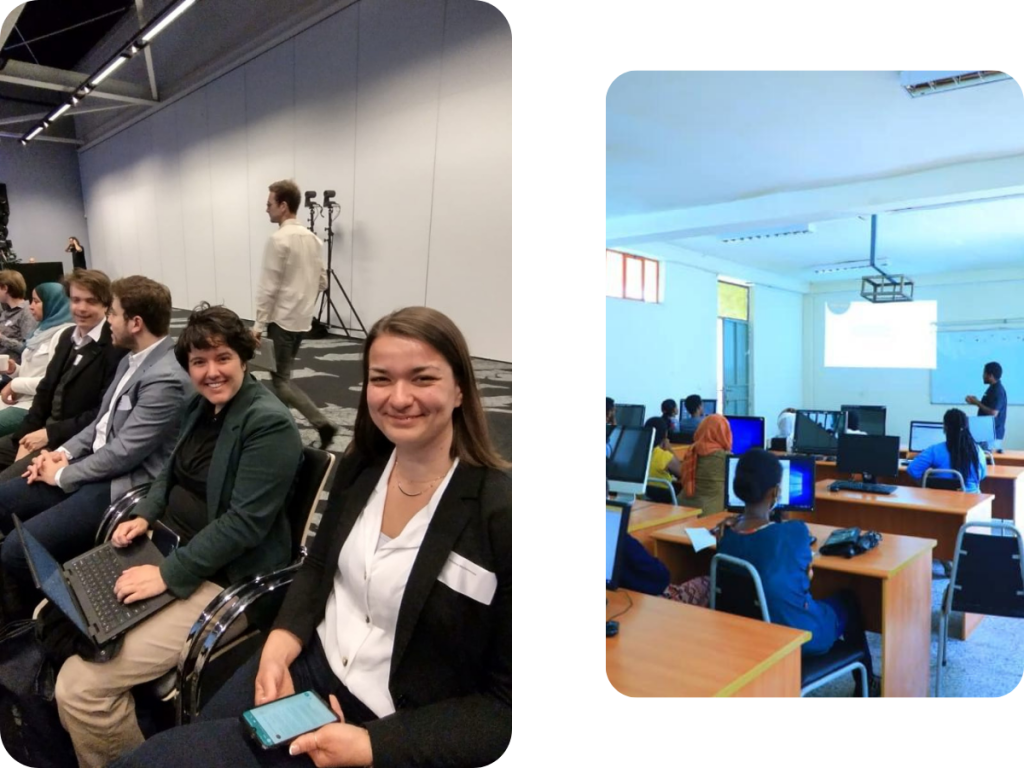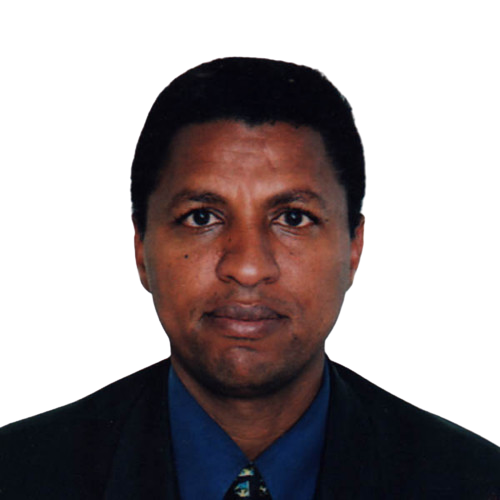
PhD
Students
GAIC is, first and foremost, a PhD network, providing training, experience and networking opportunities for PhD students. As all PhD students connected to GAIC will echo, doing your PhD at GAIC is an extremely rewarding experience. On this page, you will find information about the current PhD students, the title of their projects, and a thesis statement outlining their research problem and methdology. Exploring this page will illustrate how diverse GAIC is exactly, being united primarily by the notion of resilience, agency and a desire to contribute to the solution of global issues.
Mariam Basajja
Leiden Institute for Advanced Computer Science/Kampala International University
The prevalent concerns about data integration, data ownership and limited use of digital health data for quality treatment at point of care in Uganda result in the lack of find-ability, accessibility, Interoperability and reusability of data. This research aims to use a design case study design in form of FAIR data support to overcome lack of interoperability of Digital Health data within the health facilities by supporting remote query facility across Uganda, other VODANA member countries and beyond without data leaving the health facility in African context to enhance quality of care.
FAIR Data for Improved Healthcare Outcomes


ICTs and Digital Technologies in Human Trafficking for Ransom
Kai Smits
Tilburg University
The link between digital technology and the emergence of new forms of human trafficking has not yet been explained in the literature. I will look at how digital communications technology is used in human trafficking of Eritrean refugees from an ethnographic perspective, based on in-depth interviews with the refugees, and I will look at how inequality in control over technology impacts the exposure of refugees to being subjected to human trafficking. |
Ria Landa
Tilburg University
The SOCAV method is based on person-oriented care for people with dementia so that they get a better quality of life and maintain their independence, a behavioral change will have to occur among healthcare workers in order for the social innovation (SOCAV method) to be successful, and at the same time it should be an impetus for a culture change within the healthcare organization. This will be investigated using a real-life ethnographic mixed method study in which the environment and the people working in, are compared with the reality and supported by different theories.
The Power of SOCAV to Affect Culture Change in Organisations


Tunisia: Gatekeeping through Mobile Phone use of female victims of sexual violence
Morgane Wirtz
Tilburg University/Université de Sousse
In Libya, migrants fall into the hands of human traffickers who torture them and share their screams and suffering with their relatives via ICTs to urge them to pay a ransom. Although human trafficking for ransom is fluctuating in Libya, it has not been studied in depth in the academic field. This research describes the modus operandi of new forms of human trafficking for ransom on the south-western and south-eastern routes of Libya between 2016 and 2021.
Samson Yohannes
Leiden University Medical Center/Mekelle University
Even though clinical health data has great potential to improve health outcomes, it is hardly available for analytics within health facilities, ministries of health and scientists in Africa. There is a need for data to be Findable, Accessible, Interoperable and Re-usable(FAIR) in machine readable format to do analytics. The FAIR guiding principles make room for distributed analytics in a federated manner, adapted to places, this can support continuum of care through semantically interoperable tooling that can be adapted and contextualized to African situations. In development of the tooling and contextualization and analytics of data, the study will follow a design science research approach.
Federated Machine Learning in Health Data


Decision-Making in Policy to Improve Livelihood Opportunities for Refugees
Kristína Melicherová
Tilburg University
Protection of refugees has been a concern of various policy instruments at different levels of governance in Ethiopia, however, implementation of refugee protection policies have been facing critical failure on the ground when it comes to Eritrean refugees residing in Ethiopia. There seems to be a disparity between what policy makers intend and what is implemented at the grass root level. This ethnographic interpretetive research explores how different sets of values are affecting social processes which leads to agenda setting and the implementation of refugee protection policies at different levels of governance.
Aliya Aktau
Leiden University
There is a cultural and technological gap in African countries in terms of localized storage of patient data and data analytics at places of care. This study investigates the design of localized data storage through the development of FAIR-based architecture and capacity building in Africa.
Data Stewardship


Access and Control of FAIR-based Health System Deployment
Putu Hadi Purnama Jati
Leiden University Medical Center
The research of FAIR in Africa’s health data by VODAN-Africa focuses on the architecture development and community involvement to achieve data ownership and data interoperability. However, there is unknown information established on the perceived needs and requirements for the permissions regarding access and control of potential users regarding the data accessibility will be adapted into the system.This research investigates the basis of access and control of FAIR-based health system deployment in the VODAN project from the perspective of the Kingdon’s three streams : problem streams that related to the problems, issues or challenges of data management in health facility ; policy streams that addresses the policy options for the health data that researchers, stakeholders and executive bodies propose to solve the problem; and political stream that explore the political will, key person’s contribution and legislation to support the health data management.
Costain Tandi
Tilburg University/Great Zimbabwe University
While language marginalisation has become a problem inherent in many countries around the world in general and Zimbabwe in particular, little or no systematic studies have been carried out to understand the perceptions and views of the affected communities on whether or not the interventions being carried out to rescue the languages from extinction are successful or not. My research is an ethnographic study of the perceptions of the Tjwa people of northwestern Zimbabwe on whether or not the interventions to support the revitalisation and resuscitation of the Tjwao language by linguists, government and community working together are successful. |
Social Processes of Language and Marginalisation


TRUST Effects on PTSD and Domestic Violence in Highly Traumatized Communities
Jimmy Ben Forry
Leiden University/Kampala International University
When utilized within communities of refugees and returnees with high levels of trauma, the TRUST tool, a free brief easy-to-use psychotherapeutic intervention designed to address post-traumatic stress in highly traumatized communities, significantly increases the perceived levels of social economic resilience with further observed indications of reducing Post-Traumatic Stress Disorder and Domestic Violence. Thus, this research intends to study the effects of the TRUST tool on Post-Traumatic Stress Disorder and Domestic Violence among refugees and returnees with high levels of trauma using repeated experimental pre and post-intervention measurements in a natural setting conducted within a community as well as a clinical setting in northern Uganda. |
Femke Stoutjesdijk
Tilburg University
The mismatch between policy and implementation of person-centered care raises the question of how healthcare organizations can properly prepare and deploy to achieve an (effective) positive outcome when they want to introduce and implement a new person-centered way of working in the organization. The person-centered care approach has consequences for the internal work processes within a health organization. The client is no longer dependent on the person providing care, but now has a say/voice. This change entails that the focus on person-oriented care of clients, employees and informal caregivers and the care institution as a whole requires a changing and redeterminable attitude with regard to receiving and providing care.
Changes in Self-Management in Elderly Care


Protecting Communities from HPV, HIV and FGS Infection
Bwaga Ibrahim
Leiden University Medical Center
Cervical cancer prevention’ research focusing on prevention of HPV infection and associated lesions has overlooked the risks from co-infection with FGS and HIV and there is inadequate understanding of the differentiated priorities regarding prevention among different communities. This research investigates the medical feasibility of development of differentiated approaches that focus on the improvement of information and protection of communities from HPV, HIV and FGS infection.
Jonah Mugomba
Tilburg University/Great Zimbabwe University
Zimbabwean primary school teachers and parents are expected to effectively facilitate digital teaching and learning but their digital competences and factors affecting acquisition of these competences are unknown. Therefore, the researcher will employ an ethnographic case study and Unified Theory of Acceptance and Use of Technology (UTAUT) (Venkatesh, Morris, Davis, & Davis, 2003) to explore this issue. He will subsequently inform relevant stakeholders on related interventions for promoting digital competences among teachers and parents as well as enhancing digital teaching and learning.
ICT Education and Adoption Among Parents and Teachers in Pre-School in Zimbabwe


Resilience through TRUST in Ongoing Conflict
Kokob Gebru
Leiden University Medical Center
Trauma during conflict is prevalent among different groups in the community. There are many stressors including experiencing and witnessing different forms of violence, displacement, lack of access to basic needs and services.These all affect the psychological and social economic well being of individuals. There is a gap in that there aren’t many studies that highlight these mental health consequences during an ongoing conflict. This research looks at the trauma experienced by people under an ongoing conflict and the effect of using low-cost, easily accessible, locally adapted, (i.e., TRUST) trauma therapy on psychological and social economic resilience. The case study is implemented in of Tigray, Ethiopia.
Getu Tadele Taye
Tilburg University/Mekelle University
Patient Data across health information systems have the objective to assure quality of health service, however these systems are not used at point of care using the concept of FAIR data for Findability, Accessibility, Interoperability, and Reusability of data. Therefore, following frameworks such as Design Science and Technology-Organization-Environment (TOE), this study will implement FAIR patient data production at point of care.
FAIR Data Principles and Culture for Digital Healthcare Data Management in Ethiopia


HPV Policy, Community Resilience and Preventing FGS and HIV Co-Infection
Mildred Akandinda
Leiden University Medical Center
HPV, FGS and HIV co-infection increases risk of cervical cancer but Co-infection is poorly understood by health professionals, policy makers and communities. HPV prevention research has overlooked the risk of co-infection with FGS and HIV. There is a lack of understanding of prevention priorities in communities with varying characteristics in Uganda. This study will assess HPV policy on community resilience as a basis for prevention approaches to co-infection of FGS and HIV in Uganda.
Muluberhan Berhe Hagos
Tilburg University
The study examines the controversies over ownership, application and dynamism of customary laws in the case studies and resultant effects in the legal evolutions to develop or stagnate the customary legal system.
The Ownership, Application and Dynamism of Customary Law


Federated Learning and Analytics in the context of Healthcare
Ruduan Plug
Leiden University
Through the framework of data federation, analytics can be performed on locally reposited data without requiring direct access. Using ontology specifications, standards are defined under which these data can be interpreted and traversed. This provides opportunities for an increase in the interoperability and reusability of heterogeneous data sources. My research seeks to develop federated learning and analytics methodology for sensitive and resource-restricted environments.
Matteo Bächtold
University of Geneva
Matteo holds a bachelors degree in theology from the university of Geneva and a masters degree in religious studies from the university of Lausanne. His studies concern transformations of the Orthodox church in Ethiopia in the context of the Tigray conflict, creating potential political forces that change the nature and expression of religious practices and institutions.
Transforma-
tions of the Orthodox Tewahedo Church related to the Tigray Conflict.


Fostering FAIR Digital Health Innovation Ecosystems in sub-Saharan Africa
Natasha Buksh
École Polytechnique/Leiden University
Digital platforms alter value creation dynamics in healthcare. This PhD project will examine the challenges of attracting companies to an open healthcare data infrastructure such as the VODAN-Africa platform, and how to create the conditions for a vibrant local innovation ecosystem to form around the platform.
Anthony Wachira
Strathmore University Business School
The Influence of Enhanced Healthcare Information Technology on Universal Health Coverage in Kenya: A Case of Select Hospitals in the Counties of Isiolo, Kisumu, Machakos and Nyeri.
Health Care Information Technology in UHC


Evidence-Based Rebuilding of War-Affected Health Systems
Mahlet Mehari
Leiden University Medical Center/Mekelle University
The war in the Tigray region Ethiopia has resulted in the destruction, looting and vandalization of the health system. This has further affected health service delivery and utilization. But the extent of damage on the health system is not clearly known, there is not a definite means to assess and explain the level of the damage and a framework by which this health system can be rebuilt and become more resilient. This study intends to assess the destruction of the health facilities of the war affected health system in Tigray region and rebuilding the resilience of the health system through evidence-based solutions.
Kudakwashe Chindoza
Tilburg University/Great Zimbabwe University
The implementation of FAIR in digital data management solutions in Africa is lagging behind despite its popularity and support in Europe. One of the problems might be the perception by some African communities that FAIR is a European invention and cannot automatically fit into the African context or the failure to trust the security of shared digital healthcare data from data management solutions. This has seen most of Africa’s digital healthcare data management solutions being fragmented with the hope that such databases are more secure. However they lack interoperability and data sharing. Fragmentation of digital healthcare data could be solved by the adoption of FAIR principles, where researchers and ICT developers co-design, co-implement and co-monitor digital data management solutions. Therefore, the starting point is to evaluate the acceptance of data sharing technologies as they have been applied in Europe and find the African specific model of adoption if there are differences between the European and African perspectives.
The Implementa-bility of FAIR as a Basis for Enhancing Interoperabil-ity of Digital Healthcare Data in Zimbabwe

